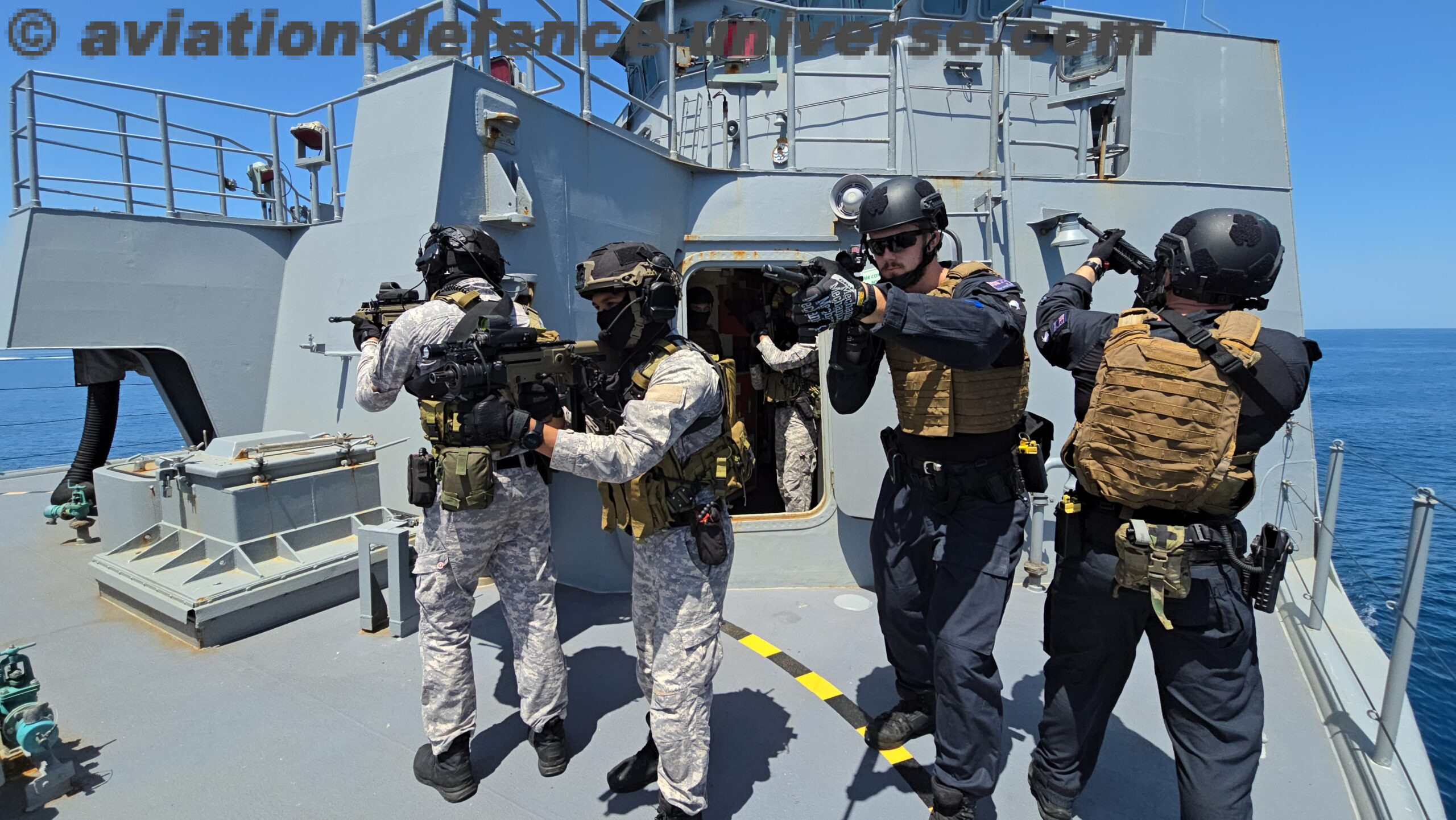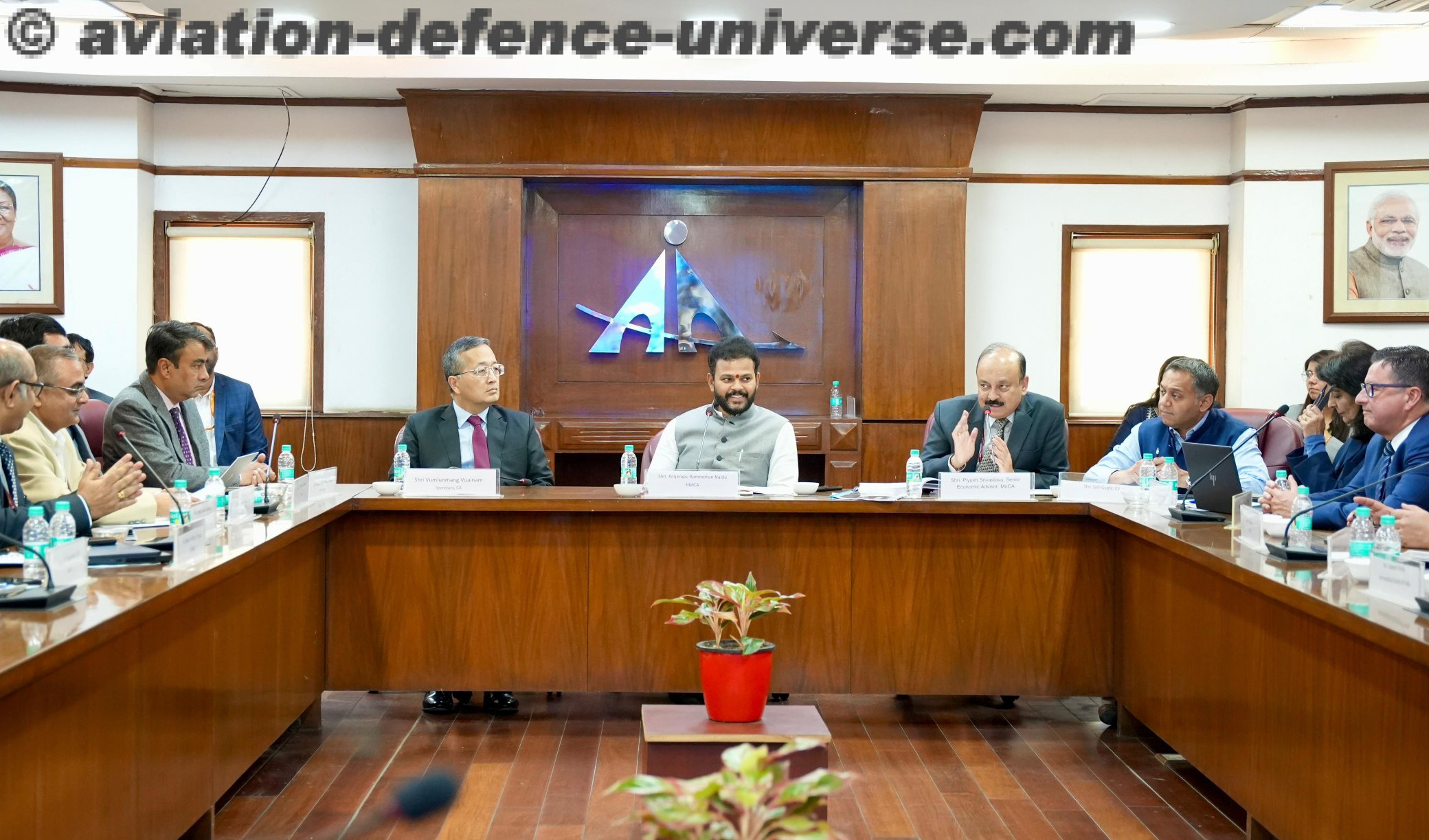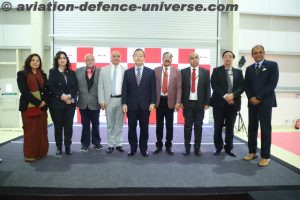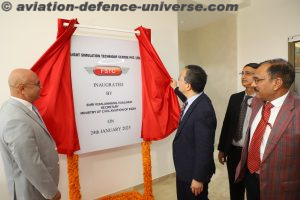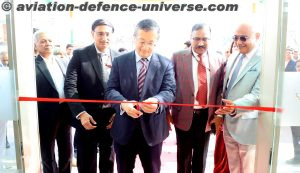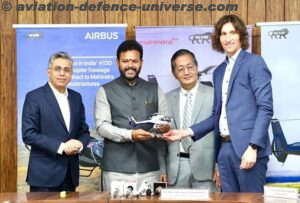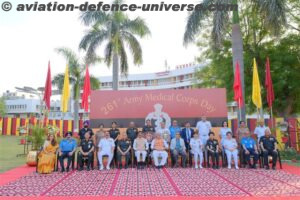- Unified National Roadmap to Propel India as a Global Aerospace Hub
By Sangeeta Saxena
New Delhi. 07 February 2025. Aircraft component manufacturing plays a critical role in supporting India’s growing civil aviation sector. As air travel demand surges and fleet expansion continues, India has a strategic opportunity to establish itself as a global hub for aerospace manufacturing, particularly in aircraft components.
Union Minister for Civil Aviation, Ram Mohan Naidu, chaired a high-level meeting today to drive forward India’s aircraft component manufacturing sector. The meeting brought together key officials, including Civil Aviation Secretary V. Vualnam, AAI Chairman Vipin Kumar, DGCA Director General Sh. Faiz Ahmed, as well as representatives from industry associations, OEMs, MROs, research institutions, and government departments. Discussions focused on strengthening domestic production capabilities and enhancing India’s global standing in aerospace manufacturing.
India’s push for Make in India and Atmanirbhar Bharat has fuelled significant growth in aircraft component production. Several global Original Equipment Manufacturers (OEMs) are increasingly sourcing parts from Indian suppliers due to their cost-effectiveness, skilled workforce, and compliance with international quality standards.
With strategic partnerships with global aerospace giants and the surging demand for air travel, India’s aircraft component manufacturing industry is experiencing rapid expansion. Leading international OEMs are increasingly sourcing components from India, recognizing the country’s high-quality production and growing expertise.
Chairing the meeting, Union Minister Ram Mohan Naidu emphasized the government’s commitment to realizing the Prime Minister’s vision for Make in India and Atmanirbhar Bharat in the aerospace sector. He stated, “India has already carved a respectable position in the global civil aviation market, but our ambition is to lead. To achieve this, we must develop a robust ecosystem that includes skill development, design, manufacturing, maintenance, certification, and knowledge sharing. By fostering close collaboration between ministries, government departments, and the industry, India can emerge as a major hub for aircraft component manufacturing.”
India’s aircraft component manufacturing sector encompasses several key aspects that contribute to its growing prominence in the global aerospace industry. Precision engineering and machining play a crucial role in producing essential components such as fuselage sections, landing gear parts, avionics, and composite structures. The industry also focuses on advanced materials and composites, developing lightweight and durable materials to enhance fuel efficiency and overall aircraft performance. Additionally, electronics and avionics manufacturing supports the production of critical components for navigation, communication, and flight control systems, ensuring the seamless operation of modern aircraft. Furthermore, India’s aerospace manufacturing capabilities extend to engine components and systems, including turbine blade production, heat exchangers, and other essential engine elements that contribute to improved efficiency and reliability in aircraft propulsion.
Reaffirming the government’s commitment to industry stakeholders, the Minister outlined a dual-pronged strategy: expanding indigenous aircraft component manufacturing by leveraging MSMEs’ supply chain capabilities while simultaneously enhancing international market access for Indian component OEMs.
Civil Aviation Secretary V. Vualnam noted, “This meeting is a crucial first step in a long journey. We will continue to engage with all stakeholders regularly to ensure continuous feedback and support for the industry’s growth.”
India’s aircraft component manufacturing sector is expanding, with global aerospace giants like Boeing, Airbus, Rolls-Royce, Pratt & Whitney, GE Aerospace, and Safran increasing their sourcing from Indian suppliers. Several Indian companies, including Tata Advanced Systems, Hindustan Aeronautics Limited (HAL), Bharat Forge, Dynamatic Technologies, and Aequs Aerospace, have established manufacturing capabilities to produce high-quality components for commercial aircraft.
India’s aircraft component manufacturing sector has seen significant advancements, with leading companies contributing to various critical areas. Fuselage and structural components are produced by Tata Advanced Systems, which manufactures fuselage sections for Boeing’s AH-64 Apache helicopters and Airbus’s A320 family, while Dynamatic Technologies supplies aerostructures for both Airbus and Boeing, and Aequs Aerospace specializes in machining precision structural components. In the landing gear segment, Safran’s Bengaluru facility plays a key role in producing components for aircraft landing gear systems, complemented by HAL and private firms that supply precision-machined landing gear parts to global OEMs.
The avionics and electronic systems sector is supported by Bharat Electronics Limited (BEL), Cyient, and Honeywell India, which manufacture critical avionics components such as flight control systems, navigation systems, and cockpit displays. Engine components and systems production is bolstered by HAL’s Koraput division, which manufactures components for both civil and military aero engines, while Tata Aerospace and Defence collaborates with Rolls-Royce to produce complex engine components. In the area of composite materials and advanced manufacturing, Boeing’s joint venture with Tata, Tata Boeing Aerospace Limited, specializes in advanced composite aerostructures for military and commercial aircraft, while Adani Aerospace is making strategic investments in carbon composite manufacturing, crucial for lightweight aircraft components. These contributions collectively strengthen India’s position in the global aerospace supply chain.
India’s Maintenance, Repair, and Overhaul (MRO) sector is emerging as a key enabler for aircraft component manufacturing, reducing dependence on foreign OEMs for spare parts and repairs. The government’s initiatives, such as reducing GST on MRO services from 18% to 5%, have enhanced India’s competitiveness as a destination for aircraft maintenance. Leading Indian MROs, including Air India Engineering Services Limited (AIESL), GMR Aero Technic, Indamer Aviation, Max Aerospace, and Air Works (Now under Adani’s ownership) , provide repair and refurbishment services for critical components such as landing gears, avionics, and engines. The sector is also driving reverse engineering and indigenization, as MROs collaborate with DRDO’s Centre for Airborne Systems (CABS), HAL, and private firms to develop localized alternatives to imported components. The MROs are expanding capabilities in localized component manufacturing, thereby reducing turnaround times for Indian airlines.
MROs further strengthen supply chain and logistics integration by working with Tier-1 and Tier-2 suppliers, ensuring faster and cost-effective component availability. Boeing and Airbus have also established partnerships with Indian MROs to maintain a steady supply of spare parts for their aircraft fleets. In addition, MROs play a crucial role in ensuring regulatory compliance and certification, adhering to DGCA, FAA, and EASA safety regulations. The DGCA has been actively promoting India’s MRO capabilities, streamlining certification processes for component manufacturing to position India as a global hub for aircraft maintenance and component production.
India is actively strengthening its position as a global aerospace hub through a multi-faceted approach that includes policy support, infrastructure expansion, skill development, and global partnerships. The government has introduced incentives under the Production Linked Incentive (PLI) Scheme for Aerospace & Defence to boost domestic component manufacturing. To enhance infrastructure, dedicated MRO hubs in Bengaluru, Hyderabad, and Nagpur are being developed to provide end-to-end component repair and manufacturing support. Recognizing the need for a highly skilled workforce, India is fostering collaborations with IITs, NITs, and aerospace universities to train engineers in advanced manufacturing and MRO operations. Additionally, the country is strengthening partnerships with leading global aerospace firms, enabling technology transfer and co-production of aircraft components. These strategic initiatives aim to position India as a self-reliant and globally competitive player in aerospace manufacturing and maintenance.
The meeting concluded on a positive note, with all participants reinforcing their commitment to collaboration and strategic partnerships. With a strong focus on skill development, technology adoption, and infrastructure enhancement, the government aims to position India as a globally competitive aerospace manufacturing hub.
With strong government backing, growing private sector participation, and increasing international interest, India is well-positioned to become a global leader in aircraft component manufacturing and MRO services. By integrating local manufacturing with MRO capabilities, the country can reduce reliance on imports, lower operational costs for airlines, and establish itself as a critical player in the global aerospace supply chain.




































